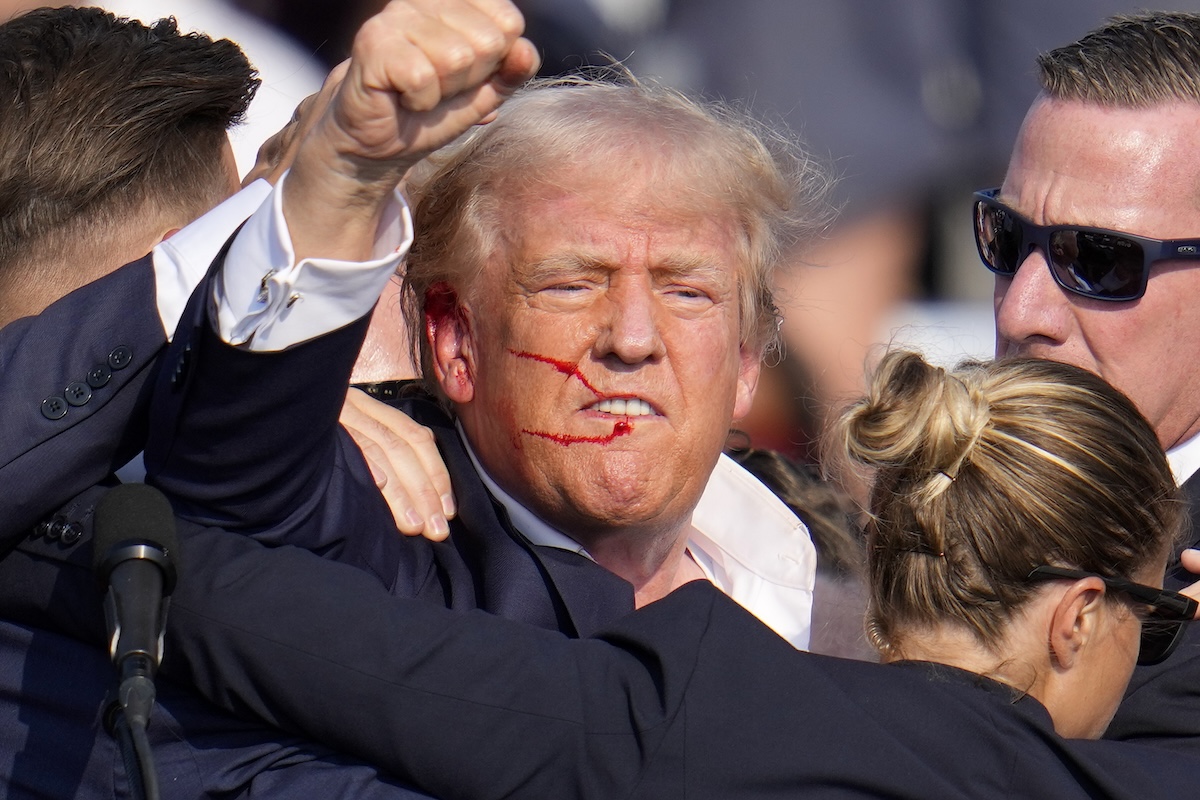The attempted assassination of Donald Trump during a political rally held in Pennsylvania on July 13, which left one dead and several wounded—including the former president—was a grotesque assault on American democracy. While both the 2024 Republican nominee and President Joseph Biden have called for unity and de-escalation of incendiary rhetoric in the wake of the shooting, many are concerned that political violence is no longer an aberration but a corollary of the polarization that has metastasized into a culturally accepted feature of Western democracy.
“Faced with the violence seen in Pennsylvania, clear words are needed,” Italian prime minister Giorgia Meloni wrote on X. “Silence, half-justifications, minimizations and demonizations are not justifiable and create the cultural humus that produces acts like the one the world has just witnessed.” France’s Marine Le Pen insisted that it was a “dramatic symbol of the violence that undermines our democracies,” while Ursula von der Leyen, president of the European Commission, wrote, “Political violence has no place in a democracy.”
The unanimous condemnation by European leaders of the attempted assassination of the former president highlights a growing concern over the stability of American democracy and the resilience of its institutions, which could, when stressed, threaten the nation’s global preeminence. But it also reveals a deeper trepidation over the continent’s own trajectory, a warning that Europe is not impervious to similar acts of political barbarism.
On May 3, in the eastern German city of Dresden, Matthias Ecke, a member of the European Parliament for the Social Democratic Party (SPD), was assaulted by a group of young men—suspected members of the right wing Alternative for Germany Party (AfD)—while affixing campaign posters ahead of the June European parliamentary elections. German chancellor Olaf Scholz unequivocally condemned the assault as a “threat” to democracy. Later that month, the Slovak prime minister, Robert Fico, a populist who has advocated for a sovereign foreign policy, was shot several times in the abdomen in what Interior Minister Matúš Šutaj Eštok called a “politically motivated” assassination attempt.
These two events stand as ominous reminders that the liberal order, hitherto considered a pillar of stability and bulwark against radical movements, is just as fragile in 2024 as it was in the 20th century.
Historians have grappled with the manifold factors contributing to the rise of totalitarian regimes in the 20th-century interwar period. The assassination of Archduke Franz Ferdinand, heir to the Austro-Hungarian throne, on June 28, 1914, by Serbian nationalist Gavrilo Princip ignited the tinderbox of deep-rooted ethnic tensions and social strife in the Habsburg Empire, setting off a chain of events that finally engulfed Europe in not one but two world wars.
The political structure of postwar Western Europe, characterized by a near uniform parliamentary model, saw new norms of social inclusivity and political compromise, as well as a normative framework of universal human rights. This developed alongside an emerging paradigm of interstate relations thereby accelerating European integration, first as an economic bloc and then as a political community. The United States, flexing its cultural, political, diplomatic, and economic influence, helped shape the West into such a viable political community, ushering in a period of peace and prosperity, a sharp counterpoint to the dialectical materialism and collectivist ethos of the Soviet Union.
While any attempt to understand the current political climate may seem premature, I maintain that it is result of a resurgent dehumanized politics, somewhat akin to mob rule, which has emerged in light of growing polarization and social atomization, constructed upon cultural debates and disparate political divisions. It was what Plato feared in his Republic: the breakdown that occurs when democracies no longer seek virtue, no longer respect natural law, and when liberty is confused with “do as thou wilt” license. In brief, dehumanized politics is downstream of mass moral and cultural decay, from the First Citizen to the everyman who shudders at the thought of hard work, religious belief, and moral excellence.
The late Monique Castillo, professor emeritus of philosophy at University Paris-Est Créteil (UPEC), expounded on these themes in her paper “Can Extreme Violence be Justified?” Reflecting on how humans are hardwired for symbols, she noted that “when the will to destroy aims not only at the adversary’s physical existence, but also at what he stands for, what he symbolizes, his morals, values, his reasons for living, there ensues a war of representations and images which, with the media spectacularly ramping up the emotional effect, leads to insupportable escalation.”
So what begins as rhetorical sparring can precipitously devolve into animosity, setting the stage for a never-ending cycle of violence. In an ecosystem of dehumanized politics, political leaders, and by extension their supporters, become abstracted to the point of being mere symbols. Human dignity, then, is no longer viewed as an innate characteristic but is conditioned on political affiliation.
Violence, when employed against a political adversary, is not only viewed with indifference but becomes morally justifiable in democratic societies to protect against perceived threats to its treasured institutions. A 2020 study tragically found that this view is shared by a growing number of Americans.
An extreme manifestation of this was seen in the immediate aftermath of the assassination attempt on Donald Trump. Across social media, some were quick to dismiss the shooting as a staged event, an orchestrated piece of political theatre by Trump to bolster his campaign. Others acknowledged the shooting as a legitimate attempt on his life but lamented that the rapid succession of bullets failed to hit their intended target.
In the United States, the 2024 election has been expressed in categorical and existential terms. Supporters of the former president and his America First, or MAGA, movement view him as their sole representative, the one who would reverse what they see as the nation’s decline. Detractors, since his election in 2016, maintain that his victory would invariably bring an end to democracy in America, often indulging in extreme hyperbole, labelling Trump a dictator and making tenuous comparisons to Hitler.
“Yes, it’s okay to compare Trump to Hitler. Don’t let me stop you,” read a December op-ed in the Washington Post. On July 7, the American magazine the New Republic featured an image of Trump fashioned after a 1932 Hitler campaign poster, with the headline: “What American Fascism Would Look Like. It can happen here. And if it does, here is what might become of the country.”
In Europe, politicians and the media have shown some restraint in employing such extreme analogies, having lived under, and still contending with, the depravity of literal totalitarian regimes. Yet the stakes of the election, and the very future of the continent, are still framed in existential terms, as Europe’s fate is still inextricably bound with America’s.
Many of the prominent issues of the upcoming election, ranging from stagnated economic growth, confused cultural identity, the imposition of “woke” ideology, and the security challenges presented by mass migration, are also topics of chief concern for Europe—and the very survival of the West rests upon confronting these issues. But violence must never be legitimized as a morally acceptable form of political expression, as it weakens civic participation and fraternity and undercuts faith in democratic institutions.
Before his election as pope in 2005, then Cardinal Ratzinger wrote Europe Today and Tomorrow, a prophetic analysis of the fundamental political, social, and cultural challenges facing the West. For Ratzinger, “the ultimate purpose of all politics is by its very nature moral, namely, peace and justice. This means that moral reasoning about, or more precisely, rational discernment of what fosters justice and peace (and therefore is moral) must be constantly carried on and defended against all that could obscure and diminish reason’s capacity for discernment.” He notes also that peace is “possible only when the essential rights of man and of the community are respected and guaranteed.”
What Ratzinger was expressing, and what we are seeing in our own time, is that authentic political participation must not be tethered to a rule that sees itself as “the ultimate principle,” but instead must be in the service of the inviolable dignity of man, “values that no majority has the right to repeal.”
The prevalence, and near justification, of political violence reveals a striking gap between the common values we purport to uphold and our willingness to depart from them to reach political ends. We need to rediscover a human politics, one that respects the innate dignity of the human. It is this absolute moral criterion that allows for the full expression of authentic freedom. Anything less than that is not only cynical but tantamount to self-destruction.

